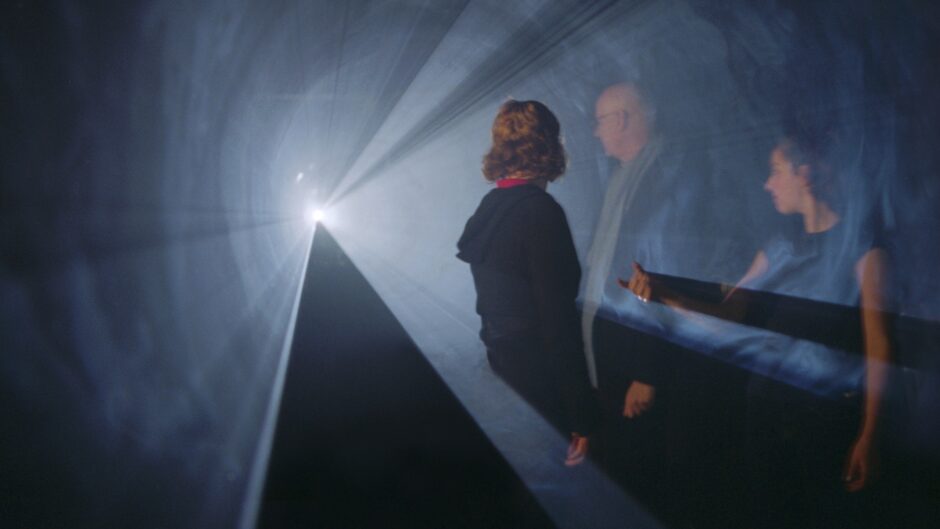Course Overview
Status
Applications are now open for 2026/7 entry through the KCL website
Location
Vernon Square, King's Cross & KCL
Duration
Full-time: 12-months, Sept 2026 – Sept 2027. Part-time: two-years, Sept 2026 – Sept 2028
Awarding body
Kings College London and The University of London
Intake
Up to 20 students per year
The MA in Contemporary Art and the Moving Image (CAMI) is a collaborative degree programme focused on the vibrant intersection of contemporary art and moving image art.
This unique course merges the expertise in film studies and critical theory in the Film Studies department at King’s College London with the specialised knowledge in modern and contemporary art history at the Courtauld. Shared between these two leading institutions, CAMI enriches students’ learning by enabling both cross-disciplinary and cross-institutional exposure and experience.
Students are taught by a variety of specialist staff across the two institutions in modules that focus on artists’ film and video, contemporary cinema, digital and time-based media, and curatorial practice, across different disciplinary and geographical contexts.
In writing their dissertation, they will be empowered to explore a research question that excites them, with support from academics who are leaders in their fields.
This programme is designed to support students who are interested in developing their critical thinking, research, writing, public presentation and programming skills, which prepares them to work and excel in a wide range of professional and academic settings. While the programme’s curricular emphasis is on critical research and writing, there will be opportunities for practise-based research in the module focused on curation and public programming as well as in other possible film studies electives.
Teaching and programme structure
Courses are divided into modules totalling 180 credits. Students will take 50% of modules at the Courtauld Institute of Art and 50% of modules at King’s College London. Both institutions are centrally located on the Strand in London.
Modules will offer a combination of historical, theoretical, and applied approaches. Students will take two required core modules, one at the Courtauld on moving image art history and one at King’s College on London film cultures, which involves site visits to galleries and cinemas across the city.
Required modules (150 credits)
You are required to take:
- Histories and Theories of Contemporary Art and the Moving Image (30 credits) at the Courtauld
- London Film Cultures (30 credits) at KCL
- Critical Debates (15 credits) at the Courtauld
- Examining Exhibitions (15 credits) at the Courtauld
- Dissertation (60 credits)
Optional modules (30 credits)
You are required to take 30 credits from a range of optional modules in the Film Studies department at KCL, which may typically include:
- Media Aesthetics
- Topics in American Cinema
- Thinking Cinema
- Critical Media Practice
- Topics in Global Cinema
- Topics in European Cinema
- Topics in Asian Cinema
- Media, Space and Place
- History, Society and the Screen
King’s College London reviews the modules offered on a regular basis to provide up-to-date, innovative and relevant programmes of study. As a result, modules offered may change. It is advised that students monitor the course finder on KCL’s website for updates here.
Please note that modules with a practical component will be capped due to educational requirements, which may mean that we cannot guarantee a place to all students who elect to study this module.
Assessment
The formal assessment of MA Contemporary Art and the Moving Image is based on a variety of coursework (contributing 100% of your final mark).
Forms of assessment may include:
- Essays and short reports
- Individual and group projects
- Filmmaking, curating, and other forms of audio-visual presentation
- Written dissertation
Programme outcomes
Upon completion of the MA Contemporary Art and the Moving Image, you will have:
- An in-depth grasp of the study of contemporary art and the moving image, and the intellectual, political and institutional issues raised by its study.
- Familiarity with a substantial body of moving image and media art, and associated critical literature and scholarship.
- Historical and theoretical frameworks of interpretation for contemporary art and the moving image.
- Advanced research, analytical, and problem-solving skills.
Careers and Employability
The Courtauld’s MA in Contemporary Art and the Moving Image will equip you with the knowledge base and skill set to pursue a wide range of career paths. The MA aims to prepare students for careers in film and moving image curation, arts and cultural management, film distribution, film and moving image criticism/journalism, and film and media education. Students may also choose to pursue academic careers through further study at PhD level.
Students from the programme will join an international network of Courtauld alumni who work across the cultural sector and benefit from the friendships, support, and mentorship available within that community.
Entry Requirements
Applications to MA Contemporary Art and the Moving Image are processed through the King’s College London admissions portal and are aligned with the admissions policies for the Film Studies MA Programme.
Please find further details about entry requirements at King’s College London CAMI MA page.
Fees and funding
Applications to MA Contemporary Art and the Moving Image are processed through the King’s College London admissions portal and are aligned with the admissions policies for the Film Studies MA Programme.
Please see King’s College London CAMI MA page to see details of fees and funding.
Support
To support you through the degree, we offer:
Wellbeing support: We have a dedicated Wellbeing team with counsellors and advisors.
Academic skills training: The academic skills tutor offers group and one-to-one classes to help you develop the skills and confidence you need to succeed on the degree. We also have two Royal Literary Fund fellows who will help you with your writing skills, concentrating on how to structure and improve your writing.
Careers advice: You can access bespoke, one-to-one career guidance throughout your studies. The Courtauld Careers Service offers advice and support on exploring career and further study options, finding internships, enhancing employability, understanding and navigating the jobs and self-employment market, and making successful applications. This service is available to all graduates for up to two years after graduation.







